|
Books Should Be Free Loyal Books Free Public Domain Audiobooks & eBook Downloads |
|
|
Books Should Be Free Loyal Books Free Public Domain Audiobooks & eBook Downloads |
|
Top Authors |
|---|
|
Book type:
Sort by:
|
By: Susanna Moodie (1803-1885) | |
|---|---|
 Life in the Clearings
Life in the Clearings
If you've read Margaret Atwood's Alias Grace, the historical fiction novel that describes a gruesome double murder in Canada in 1843, you would be interested to know the sources that were used by Atwood during her research. Life in the Clearings by Susanna Moodie was one such reference book in which the author, Susanna Moodie recounts her meeting with the infamous murderess Grace Marks, a young house help who was convicted to life imprisonment for her role in the slaying of her employers. Susanna Moodie was an Englishwoman born in Suffolk... | |
 Roughing It in the Bush
Roughing It in the Bush
'Roughing It In the Bush' is Susanna Moodie's account of how she coped with the harshness of life in the woods of Upper Canada, as an Englishwoman homesteading abroad. Her narrative was constructed partly as a response to the glowing falsehoods European land-agents were circulating about life in the New World. Her chronicle is frank and humorous, and was a popular sensation at the time of its publication in 1852. | |
By: Sinclair Lewis (1885-1951) | |
|---|---|
 Main Street
Main Street
A social satire, Main Street became a best-seller soon after its publication, fascinating readers with its biting humor and realistic portrayal of small-town communities. Published in 1920, the novel follows Carol Milford as she moves to a conventional small town, where she encounters its conceited residents characterized by their ignorance, hypocrisy, and smugness, while simultaneously being the target of their careless ridicule. Furthermore, the novel efficiently exemplifies the dividing line between the sophisticated urban setting and the conventionally governed small-town, as it tackles issues of embracing differences, social class, disillusionment, feminism, and community... | |
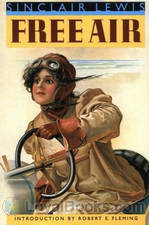 Free Air
Free Air
This road trip novel is set in the early twentieth century and follows the experiences of an aristocratic New Englander and her father as they travel by automobile from Minneapolis to Seattle. She is wooed and won by a noble but simple commoner she meets along the way. Lewis is at his usual wryly humorous self, poking fun at the upper class and treating the common people only slightly better. | |
 The Trail of the Hawk
The Trail of the Hawk
| |
 The Innocents, A Story for Lovers
The Innocents, A Story for Lovers
“Mr. and Mrs. Seth Appleby were almost old. They called each other 'Father' and 'Mother.' But frequently they were guilty of holding hands, or of cuddling together in corners, and Father was a person of stubborn youthfulness.” It is only by subterfuge that Seth is able every year to obtain his two week's vacation from the shoe store, and they are off to the farm-house of Uncle Joe Tubbs on Cape Cod. But this year the vacation turns into a full blown scheme to open a country tea room somewhere on Cape Cod, and their life suddenly begins to change. . . . (Introduction by Don W. Jenkins) | |
 Our Mr. Wrenn, the Romantic Adventures of a Gentle Man
Our Mr. Wrenn, the Romantic Adventures of a Gentle Man
"At thirty-four Mr. Wrenn was the sales-entry clerk of the Souvenir Company. He was always bending over bills and columns of figures at a desk behind the stock-room. He was a meek little bachelor--a person of inconspicuous blue ready-made suits, and a small unsuccessful mustache." Mr. Wrenn, however has a rich inner life embellished by his own imagination. When he comes into a modest inheritance, he feels he ought to learn to get out and wander a bit, and then his education begins. He finds life more "interesting", perhaps than he had "imagined". . . (Introduction by Don Jenkins) | |
 The Job
The Job
‘The Job’ is an early work by American novelist Sinclair Lewis. It is considered an early declaration of the rights of working women. The focus is on the main character, Una Golden, who desires to establish herself in a legitimate occupation while balancing the eventual need for marriage. The story takes place in the early 1900-1920’s and takes Una from a small Pennsylvania town to New York. Forced to work due to family illness, Una shows a talent for the traditional male bastion of commercial real estate and, while valued by her company, she struggles to achieve the same status of her male coworkers... | |
By: Charles Kingsley (1819-1875) | |
|---|---|
 The Water-Babies
The Water-Babies
First published in 1863, The Water Babies by Rev Charles Kingsley became a Victorian children's classic along with J.M. Barrie's Peter Pan and Lewis Caroll's Alice books. It is an endearing and entertaining novel that can equally be enjoyed by adult readers as well. However, it fell out of favor in later years since it contained many ideas that are considered politically incorrect and offensive today from a humanitarian perspective. The Water Babies, A Fairy Tale for a Land Baby to give the book its complete title tells the story of Tom, a young orphan chimney-sweep in Victorian London... | |
 The Heroes, or Greek Fairy Tales for my Children
The Heroes, or Greek Fairy Tales for my Children
The Heroes, or Greek Fairy Tales for my Children by Charles Kingsley is a collection of three Greek mythology stories: Perseus, The Argonauts, and Theseus. The author had a great fondness for Greek fairy tales and believed the adventures of the characters would inspire children to achieve higher goals with integrity. | |
 Hypatia
Hypatia
Charles Kingsley (June 12 1819 - January 23 1875) was an English divine, university professor, historian, and novelist, particularly associated with the West Country and north-east Hampshire. As a novelist, his chief power lay in his descriptive faculties, which are evident in this novel as he pictures the Egyptian desert and the ancient city Alexandria. Hypatia, 1st published in 1853, is set in 5th Century A.D. Egypt. It centers upon a young orphan monk from a desert monastery who feels called to continue his religious life in the city... | |
 Madam How and Lady Why
Madam How and Lady Why
Did you ever wish you knew how to explain natural phenomena such as earthquakes and volcanoes to your children? Search no more, this book has all the answers (at least all the ones that were known in 1869) and gives them in a pedagogical way. Listed on the Ambleside homeschooling list. | |
By: Saint Thomas Aquinas (1225-1274) | |
|---|---|
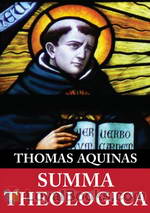 Summa Theologica, Pars Prima
Summa Theologica, Pars Prima
More than nine hundred years after it was first written, this unfinished work of a scholar saint still has the power to move our minds and hearts and set us thinking on the really important questions of life. Summa Theologica or simply the Summa as it is known, was written some time between 1265-74. It is a work that has had a profound and enduring influence on Western thought and literature. Designed to provide answers to Catholic theologians about the teachings of the Church, Thomas Aquinas' book instead goes far beyond its stated purpose... | |
By: Thucydides (Θουκυδίδης) (c. 460-395) | |
|---|---|
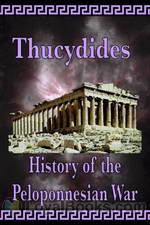 The History of the Peloponnesian War
The History of the Peloponnesian War
The History of the Peloponnesian War is an account of the Peloponnesian War in Ancient Greece, fought between the Peloponnesian League (led by Sparta) and the Delian League (led by Athens) in the 5th Century BC. It was written by Thucydides, an Athenian general who served in the war. It is widely considered a classic and regarded as one of the earliest scholarly works of history. The History is divided into eight books. These book divisions are the work of editors in later antiquity. W. R. Connor [...] describes Thucydides as “an artist who responds to, selects and skillfully arranges his material, and develops its symbolic and emotional potential.” | |
By: Elizabeth Barrett Browning (1806-1861) | |
|---|---|
 Sonnets from the Portugese
Sonnets from the Portugese
Poetry lovers and lovers themselves would certainly know and remember these lines: “How do I love thee? Let me count the ways.....” These and other sublime verses are contained in this collection of tender, mystical, philosophical poems Sonnets from the Portuguese, published originally in 1850. The poet herself was part of one of the most famous literary love-stories of all time – a saga filled with romance, danger and severe opposition from her family. Born into a prominent and extremely wealthy family in Durham, England, she began writing as a child and her father encouraged her talent by getting a collection of poems published when she was only twelve... | |
 A Drama of Exile
A Drama of Exile
In writing her ‘Drama of Exile’, Barrett’s subject was ‘the new and strange experience of the fallen humanity, as it went forth from Paradise into the wilderness’. The bizarre, lyrical scenes that follow powerfully describe the grief and guilt of Eve, the sorrowful pride of Lucifer, and the redeeming power of love. | |
 The Battle of Marathon
The Battle of Marathon
The Battle of Marathon is a rhymed, dramatic, narrative-poem by Elizabeth Barrett Browning. Written in 1820, it retells powerfully The Battle of Marathon: during which the Athenian state defeated the much larger invading force during the first Persian invasion of Greece. When Darius the Great orders his immense army march west to annex additional territories; no-one in the Persian court predicted that some fractious, independent Greek city-states stood any chance against the Persian super-power.... | |
By: Aeschylus (c. 525/524-456/455 BC) | |
|---|---|
 Prometheus Bound (Browning Translation)
Prometheus Bound (Browning Translation)
Whether or not it was actually written by Aeschylus, as is much disputed, "Prometheus Bound" is a powerful statement on behalf of free humanity in the face of what often seem like the impersonal, implacable Forces that rule the Universe. As one of the most compelling rebel manifestos ever composed, it has appealed not only to the expected host of scholars of Greek drama, but also to a fascinatingly free-spirited array of translators, especially since the early 19th century; Percy Bysshe Shelley, Henry David Thoreau, and activist-poet Augusta Webster are among those who have tried their poetic and linguistic powers at rendering it into English... | |
By: Kate Douglas Wiggin (1856-1923) | |
|---|---|
 Rebecca of Sunnybrook Farm
Rebecca of Sunnybrook Farm
Eleven year old Rebecca Rowena Randall travels to Riverboro, Maine, to live with her spinster aunts, Jane and Miranda Sawyer. Her father has been dead for three years and her mother is unable to cope with her brood of seven growing children. Rebecca is being sent to her aunts' farm to try to improve her prospects in life and also ease the family's burden. The aunts had actually wanted her older and more placid sister, Hannah, who is more handy round the house to be sent, but Rebecca's mother sends the dreamy, more imaginative Rebecca instead... | |
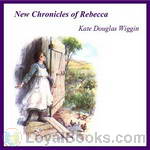 New Chronicles of Rebecca
New Chronicles of Rebecca
This book tells further stories from the period of Rebecca’s sojourn in Riverboro. | |
 The Birds' Christmas Carol
The Birds' Christmas Carol
Born on Christmas Day, little Carol Bird is a gentle soul who touches every life around her. Despite physical illness, Carol is loved by everyone who knows her. This year, she is going to make Christmas extra special for her family and the little Ruggles children who live nearby. (Introduction by Andrea Boltz) | |
 The Diary of a Goose Girl
The Diary of a Goose Girl
The "Goose Girl" is a young and somewhat independent lady who, in fleeing from her lover with whom there had been a "little tiff," became a "paying guest" at poultry farm in a quiet, out-of-the-way Sussex village, in the care of which she participates. From the author of Mother Carey's Chickens, The Bird's Christmas Carol, etc. | |
 The Old Peabody Pew: A Christmas Romance of a Country Church
The Old Peabody Pew: A Christmas Romance of a Country Church
A sweet, old fashioned Christmas romance set in an old New England meeting house. | |
 The Romance of a Christmas Card
The Romance of a Christmas Card
The story of the mission of two Christmas cards written by a minister’s wife. These cards find their way to two straying sheep from the village fold, who hear through the message in the words, and the little scenes on the cards, the compelling voice of home. There was inspiration and good cheer in the cards, and from them came, in one case reformation, in the other romance. | |
By: Heinrich von Kleist (1777-1811) | |
|---|---|
 Michael Kohlhaas (English Translation)
Michael Kohlhaas (English Translation)
Michael Kohlhaas is an 1811 novella by Heinrich von Kleist, based on a 16th-century story of Hans Kohlhase. Both the theme (a fanatical quest for justice) and the style (existentialist detachment posing as a chronicle) are surprisingly modern. They resonated with other writers more than a century after it was written. Kafka devoted one of only two public appearances in his whole life to reading passages from Michael Kohlhaas. Kafka said that he "could not even think of" this work "without being moved to tears and enthusiasm." | |
By: Leon Trotsky (1879-1940) | |
|---|---|
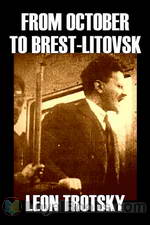 From October to Brest-Litovsk
From October to Brest-Litovsk
This account by Trotsky is of the events in Russia from the October Revolution of 1917 in Petrograd, to his signing of the Brest-Litovsk treaty with Germany on 3rd March 1918 which took Russia out of the First World War. The treaty exacted heavy losses for Russia in terms of annexations of land and financial indemnities to Germany. In this extended essay, Trotsky argues the reasons as to why he decided to sign what appears to be a disastrous agreement for Russia. | |
By: Publius Cornelius Tacitus | |
|---|---|
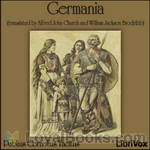 Germania
Germania
The Germania (Latin: De Origine et situ Germanorum, literally The Origin and Situation of the Germans), written by Gaius Cornelius Tacitus around 98, is an ethnographic work on the Germanic tribes outside the Roman Empire. Germania fits squarely within the tradition established by authors from Herodotus to Julius Caesar. Tacitus himself had already written a similar essay on the lands and tribes of Britannia in his Agricola. The Germania begins with a description of the lands, laws, and customs... | |
 The Annals
The Annals
The Annals was Tacitus’ final work, covering the period from the death of Augustus Caesar in the year 14. He wrote at least 16 books, but books 7-10 and parts of books 5, 6, 11 and 16 are missing. Book 6 ends with the death of Tiberius and books 7-12 presumably covered the reigns of Caligula and Claudius. The remaining books cover the reign of Nero, perhaps until his death in June 68 or until the end of that year, to connect with the Histories. The second half of book 16 is missing, ending with the events of the year 66... | |
 Agricola
Agricola
The Agricola (Latin: De vita et moribus Iulii Agricolae, lit. On the life and character of Julius Agricola) is a book by the Roman historian Tacitus, written c 98, which recounts the life of his father-in-law Gnaeus Julius Agricola, an eminent Roman general. It also covers, briefly, the geography and ethnography of ancient Britain. As in the Germania, Tacitus favorably contrasts the liberty of the native Britons to the corruption and tyranny of the Empire; the book also contains eloquent and vicious polemics against the rapacity and greed of Rome. This translation by Alfred John Church and William Jackson Brodribb, was first published in 1877. | |
 Tacitus' Histories
Tacitus' Histories
The Histories was written between 100 and 110 A.D. It covered the Year of Four Emperors following the downfall of Nero, the rise of Vespasian, and the rule of the Flavian Dynasty up to the death of Domitian. Only the first four books and 26 chapters of the fifth book have survived, covering the year 69 and the first part of 70. The work is believed to have continued up to the death of Domitian on September 18, 96. As a prelude to the account of Titus’s suppression of the Great Jewish Revolt, Book 5 features a short ethnographic survey of the ancient Jews as seen from the Roman point of view. This translation was first published in 1912 | |
 A Dialogue Concerning Oratory, or the Causes of Corrupt Eloquence
A Dialogue Concerning Oratory, or the Causes of Corrupt Eloquence
The scene of the Dialogus de Oratoribus, as this work is commonly known, is laid in the sixth year of Vespasian, 75 a.D. The commentators are much divided in their opinions about the real author; his work they all agree is a masterpiece in the kind; written with taste and judgement; entertaining, profound, and elegant. It is normally considered to have been written by Tacitus, even though some ascribe it to Quintilian. The main subject is the decadence of oratory, for which the cause is said to be the decline of the education, both in the family and in the school, of the future orator. In a certain way, it can be considered a miniature art of rhetoric. | |
By: Alexis de Tocqueville (1805-1859) | |
|---|---|
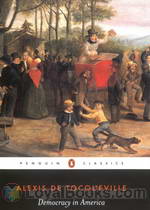 Democracy in America
Democracy in America
Arguably, one of the most influential and insightful pieces of work concerned with American political life, Democracy in America directs itself towards American politics and society, and is considered to be one the best books written on the subject. Published in 2 volumes, in 1835 and 1840, Tocqueville records his findings after studying the thriving nation in his nine month exploratory journey. The young French aristocrat first came to America on an official assignment to study the American penal system, but instead used this as a pretext to study American society... | |